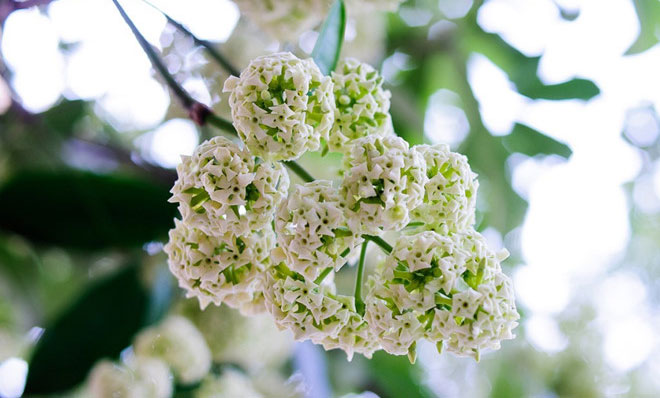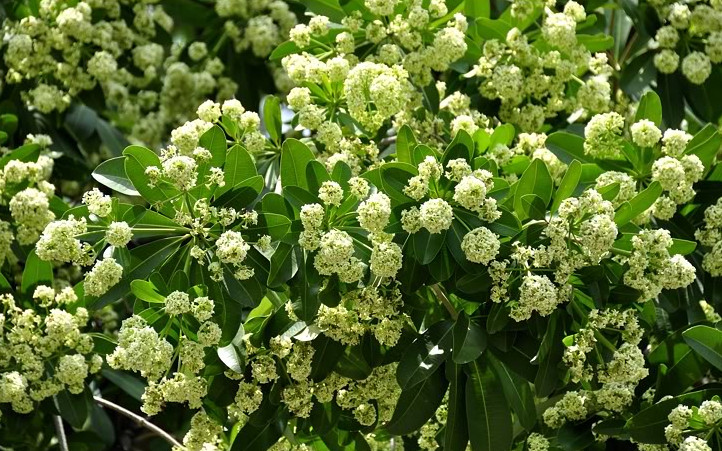Effects and harms of milk flowers
Dairy products with appropriate concentrations and doses are beneficial for health, but when overused, they can cause toxicity.
What is milk flower?
Milk flowers, also known as crab groping, crab furrows, have the scientific name: Alstonia scholaris. This is a species of evergreen tropical plants belonging to the genus Milk Flower, La La Ma.

Milk flowers are missed, evergreen trees, up to 50m tall.
Milk flowers are missed, evergreen trees, up to 50m tall. Rhythmic growth divides into the canopy. The stem is straight, round, the root can be brown, cracked shells along with humus, opaque white plastic, white flesh. The monotone leaves grow from 3-10 leaves. The leaves are inverted eggs, 10 - 25 cm long, 4 - 7 cm wide, head in prison or slightly concave, wedge tail.
Trees distributed in mixed forests are also often planted in villages or trees along roads. In nature, trees appear at an altitude of 200-1000m above sea level. Worldwide distribution of trees in East and South Asia, Australia: South China, India, Nepal, Sri Lanka, Cambodia, Myanmar, Thailand, Vietnam, Indonesia, Malaysia, Singapore, Philippines, Australia (Queensland) , Papua New Guinea.
Plants are also grown in many regional countries with other tropical and subtropical climates.
Effect of
Plastic, shell, milk flower leaves are ingredients used as medicine, extracting chemical components are essentially alkaloids, steroids .
The bark contains alkaloids like ditamine, echitenine and echitamine and is used as an antimicrobial agent, as an alternative to Quinine.

India is a widely used place of milk flower preparations for treatment.
Bark juice has the effect of treating diarrhea, gastrointestinal disorders, reducing fever, regulating menstruation. Decoction of leaves is used to treat beribri (polyneuropathy due to deficiency).
India is a widely used place of milk flower preparations for treatment. Many animal studies have demonstrated that extracts of milk flower bark are used with antibacterial and antiparasitic effects.
In addition, it protects liver cells, prevents cancer cell growth, reduces pain, prevents gastrointestinal, antioxidant (antioxidant), regulates immune, anti-asthma, and treatment of inflammation. management. Because they work by bronchodilator, anti-allergy, soothe skin lesions and reduce allergy symptoms on the skin.
Milk also stimulates eating and increases lactation in lactating women. Because cacstacs are antibacterial, in India, milk flowers are also used in the ingredients of toothpastes.
According to Oriental medicine, the milk flower bark is bitter, cold, has the ability to heat, detox, induce, asthma, only thirst, suppress (malaria mosquito transmission) development, taste. The dried bark of the canopy is smooth and sharp, taking drinking water, drinking 1-3g of powder daily, having the effect of cooling heat, stimulating digestion. Decoction of solid bark has the effect of curing toothache, preventing skin ulcers and sores.
Golden star leaves on the day drink 20g cure vomiting vomiting anemia caused by chemotherapy . It can be said that the useful effect of milk flowers with health is very diverse and should continue to be researched to further clarify.

Milk flowers have a strong smell, if inhaled much, it makes people feel dizzy .
Herbalist Vu Quoc Trung (member of Vietnam Oriental Medicine Association) shared that milk flowers have many harmful effects on health. Milk flower plants have more than 40 species, the common characteristic is quite high plants, thick shells, melted plastic like milk should be called milk flowers.Flowers smell strong, if inhaled, it makes people feel dizzy, tired, breathless.
Flowers and fruits of plants are hairy, can spread in the air, cause allergies, sinusitis and respiratory diseases. People with an allergy-prone environment will be itchy and have more acne. Milk pollen is easy to make elderly, young children allergic rhinitis, bronchitis. People with a history of asthma and sinusitis are more persistent.
Chinese physician also expressed, if in a small town with a milk flower plant, it will be pleasant, but planting many trees is counterproductive. People with cough, sinusitis and headache, nausea, can be caused by inhaling many flowers of milk flowers.
- Not only in Vietnam, but milk flowers are also the contradictory flowers famous across the continent
- Photo set: Milk flower - A unique charm of autumn Hanoi
- A series of gorgeous flowers and flowers in the sky and sky in Hanoi
- Things to know about nut milk and health
- Cancer medicine from breast milk
- Breast milk and 12 strange things not everyone knows
- Hanoi and the season of beautiful flowers captivated people
- Flowers make human emotions sublimated
- Detecting breast milk containing cancer killers does not cause side effects
- Why is milk white?
- Mistakes about parental milk should be understood
- How to grow and care vy wing flowers
 Green tea cleans teeth better than mouthwash?
Green tea cleans teeth better than mouthwash? Death kiss: This is why you should not let anyone kiss your baby's lips
Death kiss: This is why you should not let anyone kiss your baby's lips What is salmonellosis?
What is salmonellosis? Caution should be exercised when using aloe vera through eating and drinking
Caution should be exercised when using aloe vera through eating and drinking Why does milk reduce the effectiveness of antibiotics?
Why does milk reduce the effectiveness of antibiotics?  Why do Asians have a harder time absorbing milk than other races?
Why do Asians have a harder time absorbing milk than other races?  This type of wood is known as 'open-air gold': The Chinese royal family trusts it and uses it, rich people bring sacks of money to buy it!
This type of wood is known as 'open-air gold': The Chinese royal family trusts it and uses it, rich people bring sacks of money to buy it!  Doctors point out two main causes of milk poisoning
Doctors point out two main causes of milk poisoning  How did NASA research create a premise for formula milk?
How did NASA research create a premise for formula milk?  What is always kept by the Mongol cavalry in their cloaks and carried away to 'fight the east and clear the north'?
What is always kept by the Mongol cavalry in their cloaks and carried away to 'fight the east and clear the north'? 